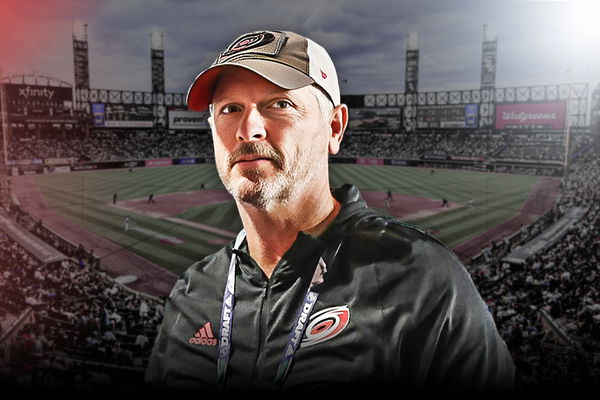

Major League Baseball has been playing it safe for too long. But MLB Commissioner Rob Manfred is not scared to stir the pot. We’ve already seen the pitch clock, ghost runners in extra innings, and whispers of automated strike zones. And now… well, things could get interesting.
Watch What’s Trending Now!
On Sunday Night Baseball, Commissioner Rob Manfred hinted at making traditionalists choke: expansion and full divisional realignment. “I think if we expand, it provides us with an opportunity to geographically realign,” he said. “I think we can save a lot of wear and tear on our players in terms of travel.” His goal: 32 teams by the time he retires in 2029. For now, Nashville and Salt Lake City are the early favorites, but dark horses like Charlotte, Portland, and Austin are in the mix, and now Raleigh, North Carolina, is making a serious push too.
Backed by Carolina Hurricanes owner Tom Dundon, Raleigh is leading the charge. In doing so, he’s pitching the city’s booming population, strong economy, and rabid sports fans as reasons MLB should plant a flag there. If Raleigh gets in, it could trigger eight divisions of four teams, shorter travel, regional rivalries, and a postseason that makes sense.
But is there a chance Raleigh could steal a spot, given that MLB will only add two new teams? Yes, Raleigh could potentially land an MLB expansion team, but it depends on several critical factors working in its favor.
The cost of entry
Franchise rights are MLB’s official permission to own a team, and cities like Raleigh and Austin don’t have them yet. But to earn them, they need to go through the expansion process. But this comes with a hefty price tag.
Expansion fees are projected between $750 million and $1.5 billion, with some sources suggesting hot markets could push that figure as high as $2.2 billion, depending on franchise valuations. To put it in perspective, Austin’s bid alone is estimated at $2.25 billion just for franchise rights, not including stadium construction. Still, Raleigh stands out.
As Tom Dundon’s net worth is estimated $1.2, and supported by strong local support. Moreover, expansion fees would be shared among the existing 30 teams, helping offset pandemic-related losses that could exceed $3–4 billion. But Raleigh has one more critical factor to purchase the team.
Building more than a stadium
Building an MLB stadium is no small feat, with costs estimated between $1 billion and $2 billion. Like Las Vegas’ Athletics stadium sits at $1.75-$2 billion, Orlando’s proposed stadium is in a similar range, and the projected cost to upgrade Charlotte’s Truist Field, a 10,200-seat minor league stadium to MLB standards, is estimated between $500 million and $1 billion. But Raleigh?
Raleigh, however, has flexible financing options: full private funding like the Rams’ SoFi Stadium, public financing through taxes or bonds as in Kansas City, or public-private partnerships like Charlotte’s Truist Field. This combination of strategic funding and strong backing has a significant economic impact.
Job Creation: Construction and operation of the stadium can create thousands of jobs.
Increased Revenue: Local businesses, including hotels, restaurants, and retailers, often see increased revenue due to the influx of visitors and events.
Tax Revenue: The city and state can benefit from increased tax revenues generated by the stadium and associated activities.
As for location, potential sites include the Southern Gateway, part of Raleigh’s 10-year downtown plan, and the area surrounding PNC Arena, which could naturally complement a future MLB ballpark.
Why does Raleigh stand out?
Here, Carolina Hurricanes owner Tom Dundon is leading a $1.1 billion redevelopment around PNC Arena, including $300 million in public investment for arena upgrades and $800 million in private funding for an 80-acre mixed-use entertainment district. With this scale of investment, Raleigh is staking a serious claim as a future MLB city.
Redevelopment Highlights:
Phase One (Dec 2025): Housing and offices near Edwards Mill Road, with entertainment right next door.
Mixed-Use District: Shops, hotels, residences, and offices turn empty lots into a buzzing destination.
Tailgating & Music: A dedicated tailgate zone and a music venue rivaling Red Hat Amphitheater in scale
These plans make Raleigh a strong candidate for an MLB stadium.
How MLB will grow
MLB’s formal bid window is expected in Q2 2026, with owners likely voting on expansion candidates by late 2027. If approved, new teams could begin play as early as 2028.
The process looks like this:
Pre-Qualification (2025): Resolve stadium issues for the Rays and relocated Athletics.
RFP Issued (Q2 2026): Formal six-month bid process opens.
Site Visits & Votes (2027): Owners vet finances and tour cities; 75% approval required.
Announcement (Late 2027–Early 2028): Two cities awarded teams; branding and stadium design begin.
Expansion could bring eight divisions of four teams and a larger postseason, boosting national TV appeal. Suddenly, baseball isn’t just on your TV…it feels alive everywhere. And Raleigh? This bid isn’t just about a new team. It’s about a city on the rise, full of energy, ambition, and vision, exactly the kind of place that could shake up Major League Baseball in a way fans will notice.

